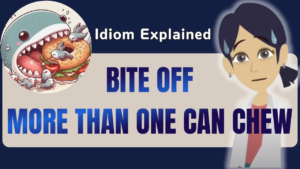Ever made grand promises only to discover the harsh reality of actually following through?
something that seems easy in theory but is hard to do in practice
Have you ever enthusiastically declared “I’ll start that ambitious project tomorrow!” only to struggle when the time comes?
This perfectly captures the essence of “easier said than done.” Tasks often sound straightforward in conversation, but execution proves far more challenging.

This timeless idiom has persisted since the 15th century because it resonates with our universal human experience.
From professional deadlines to personal goals like learning languages or training for marathons, we consistently underestimate the effort required to accomplish our ambitions.
In this guide, we’ll explore this expression’s meaning, history, and practical applications in everyday conversation.
Meaning of This Idiom
Definition & Insights
- Definition: “Easier said than done” highlights the gap between speaking of a plan or intention and actually completing it. Although an idea may sound straightforward in theory, the reality of putting that idea into action can be far more complex.
- Purpose: The phrase underlines the notion that actions speak louder than words. Anyone can propose a grand idea or make a promise, but following through requires determination, effort, and sometimes courage.
- Historical Roots: While the exact origin remains murky, this idiom has been used in English for centuries. Early forms of the expression date back to at least the 15th century. This longevity underscores its timeless relevance.
Daily Use & Importance
- Professional Plans: Ever promised your team that you would finish a project by Friday, only to discover it was more complex than anticipated? That moment where ambition collides with reality encapsulates “easier said than done.”
- Personal Goals: Learning a new language, training for a marathon, fixing a leaky faucet—these tasks appear deceptively simple when we casually mention them. But once we roll up our sleeves, the difficulties become crystal clear.
- Universal Truth: Across cultures and contexts, people tend to underestimate the effort required to accomplish tasks. That’s why “easier said than done” has persisted for centuries—it’s a universal human experience.
Examples & Stories
Humorous Anecdotes
- Running a Marathon: An individual might boldly declare, “I’m going to run a marathon next month!” The plan sounds exciting, but after a few days of training, they realize 26.2 miles is no joke. Suddenly, the promise that once rolled off the tongue becomes a monumental challenge.
- Fixing a Faucet: How many times have you thought, “I’ll fix the sink myself this weekend”? Hours later, you may find yourself knee-deep in water, scrambling for the plumber’s number. Clearly, it was “easier said than done.”
- Learning a New Language: Many people vow to learn Spanish, French, or another language. They buy textbooks, download apps, and start day one enthusiastically. By week two, the complexities of grammar, vocabulary, and pronunciation make them realize that practice is critical—and it isn’t so easy.
Examples & Rephrasing
Common declarations that illustrate “easier said than done”:
- “I’ll start exercising tomorrow.”
- “I’ll finish the project by Friday.”
- “I’ll learn to play the guitar in a week.”
- “I’ll save enough money for a big trip.”
- “I’ll quit smoking next month.”
How can we rephrase them?
- Original: “Saving money for a vacation is easier said than done.”
Rephrased: “Saving money for a vacation is more challenging than it sounds.” - Original: “Quitting smoking is easier said than done.”
Rephrased: “Quitting smoking is much harder than simply talking about it.” - Original: “Learning a new language is easier said than done.”
Rephrased: “Learning a new language requires more commitment than people often expect.”
Origins & Fun Facts
- Timeless Relevance: The phrase has been part of English usage since around the 15th century, underscoring how often humans misjudge the difficulty of tasks.
- Universal Message: Whether you’re talking about personal goals or professional endeavors, “easier said than done” reminds us not to underestimate the effort and discipline required.
Fun Facts
- Longevity in Language: The expression’s continued presence in modern speech highlights a shared human tendency to talk first and realize the difficulties later.
- Professional Usage: In the workplace, it’s a gentle nudge or a diplomatic way to remind someone that planning something grand is different from bringing it to life.
- Philosophical Insight: The phrase aligns with the viewpoint that taking real action is the ultimate measure of commitment and sincerity.
Opposites & Related Idioms
Sometimes, you might want to convey the exact opposite meaning of “easier said than done.” In these cases, English offers a variety of expressions:
- Opposite Expressions:
- “A Piece of Cake”: Implies something is extremely easy.
- “No Sweat”: Suggests no difficulty or stress is involved.
- Related Idioms:
- “Actions Speak Louder Than Words”: Emphasizes that true intentions or skills become evident through action, not talk.
- “Bite Off More Than You Can Chew”: Warns against taking on a task too large or complex to handle comfortably.
- “Talk Is Cheap”: Conveys that words alone hold little value without concrete actions.
- “Put Your Money Where Your Mouth Is”: Urges someone to back up their words with real commitment (financial or otherwise).
- “Walk the Talk”: Encourages following through on promises and matching your words with deeds.
These idioms and phrases share a common thread: they highlight the dynamic between speaking and doing, cautioning us not to forget that true success lies in accomplishment, not just in speech.
Use This Idiom Confidently
Tips to Use This Idiom
- Be Relatable: Refer to tasks or goals that are commonly understood to be challenging. This makes your use of the idiom feel natural and grounded.
- Be Honest: Acknowledge the inherent difficulty of certain pursuits. It helps you connect with people who might share the same struggles.
- Add Humor: Throw in a lighthearted remark. For example, “I thought I’d run a marathon without training—talk about ‘easier said than done’!”
- Offer Solutions: While recognizing that a task is tough, propose ways to tackle it. Balance humor with practical advice.
Avoiding Awkward Situations
Imagine a friend or colleague claiming they will achieve something highly ambitious in an unrealistically short timeframe.
By gently inserting “easier said than done” into the conversation, you can remind them of the potential hurdles—without directly criticizing or discouraging their enthusiasm.
Real Use & More Idioms
From Words to Action
The reason “easier said than done” resonates so strongly is its stark reflection of reality. Human nature often drives us to talk about goals, but the transition from words to action demands perseverance.
Examples:
- Somebody exclaims, “I’ll organize my entire house this weekend!” Yet Monday arrives, and the house remains in disarray.
- A colleague declares, “I’ll handle that new project effortlessly,” but struggles to meet the first deadline.
By using the idiom in these scenarios, you underscore the importance of realistic planning and personal discipline.
Related Idioms in Use
- “Bite Off More Than You Can Chew”
If you see someone about to commit to an overwhelming project, you might warn, “Don’t bite off more than you can chew.” - “Talk Is Cheap”
When lofty promises remain unfulfilled, someone might comment, “Talk is cheap—let’s see some results!” - “Actions Speak Louder Than Words”
If a friend constantly talks about traveling the world but never leaves town, this idiom is an appropriate reminder that real experiences outweigh fantasies.


Pop Quiz: Check Your Idiom Skills
Easier Said Than Done

Key Takeaways
- Core Meaning: “Easier said than done” emphasizes that it is much simpler to speak of a plan than to execute it.
- Everyday Relevance: From running marathons to fixing faucets, it covers a wide array of daily life scenarios.
- Cultural Resonance: Idioms like “Actions speak louder than words,” “Bite off more than you can chew,” and “Talk is cheap” revolve around similar truths—speech alone rarely guarantees results.
- Practical Use: Employ this idiom to add a touch of realism and wit to your conversations. It helps maintain honesty while keeping the mood light.
- Final Reminder: Mastering idioms might be challenging, but that’s no reason to shy away. Keep learning, practicing, and applying them in real discussions.
The next time you find yourself or someone else proclaiming grand intentions, remember to slip in “easier said than done.”
Doing so will show your nuanced understanding of English expressions—and perhaps prompt a moment of reflection about just how complex action can be.



While speaking up is vital, accomplishing what we set out to do is where true success resides.









Comment